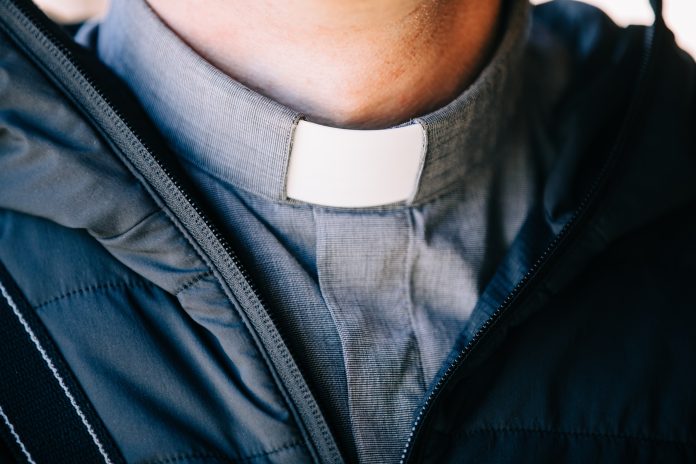No phones, no Facebook, no Amazon, no Netflix.
When Fr. Josh Mayer entered St. John Vianney’s Seminary in Denver, his first year looked a little more monk-like than what some might expect.
“It had to do with getting weaned off of the damaging effects of media, and then being able to see them for what they are when you come out on the other side of that,” Mayer told CNA.
Besides fasting from their phones and the internet, the seminarians also went on a commerce fast, where they were not allowed to make purchases. The only day the men did not observe these fasts was Saturday, when they could call friends and family or buy things they needed.
The year was also peppered with spiritual direction and counseling, as well as spiritual retreats, culminating with a 30-day Ignatian retreat. There were classes, but no grades. Book assignments, but no reports.
In January, after Christmas break, the men were sent out two-by-two for 30 days, with about $80 and a backpack, heading to unbeknownst-to-them mission destinations, for what is known as a poverty immersion. Mayer can’t say where he went, so as not to ruin the surprise for other seminarians, “but I can tell you that it was awesome.”
These experiences were some of the key parts of Spirituality Year – the introductory year of the seminary program at St. John Vianney in Denver that is designed to give men a break from academics for a more intense focus on their spiritual and human formation.
“They call it a year of the heart,” Mayer said. “So a year to focus on your relationship with the Lord and to engage in deeper prayer than probably anybody who’s in spirituality year has ever engaged in before.”
When Mayer entered his spirituality year 10 years ago, the Denver seminary was one of the only ones in the United States with such a program. Today, more seminaries throughout the country are looking to St. Vianney’s program as a model for their own “propaedeutic,” or preparatory years.
The authority in the Church that governs the formation of seminarians is the Vatican’s Congregation for the Clergy, which provides its guidance for formation in the Ratio Fundamentalis Instituionis Sacerdotalis (or “Ratio”).
Following this “Ratio,” each country’s bishops’ conference then prepares their own “Ratio Nationalis.” In the U.S, this document is entitled “The Program of Priestly Formation.” The current edition of this document suggests a “propaedeutic period” for seminaries, but the U.S. bishops’ conference told CNA that the document is being updated, and such a period will become the norm in U.S. seminaries with the new edition.
According to the Vatican’s 2016 Ratio, the purpose of such a period “is to provide a solid basis for the spiritual life and to nurture a greater self-awareness for personal growth.”
“It must always be a real time of vocational discernment, undertaken within community life, and a ‘start’ to the following stages of initial formation,” the Ratio states.
Pope John Paul II wrote in the 1992 document “Pastores Dabo Vobis” (I Will Give You Shepherds) of the growing need for propaedeutic years for seminarians, due to the rapidly changing cultural, technological and ideological landscapes of the modern world.
“[T]here is spreading in every part of the world a sort of practical and existential atheism,” he wrote, in which “the Individual, ‘all bound up in himself, this man who makes himself the center of his every interest’…even as a wide availability of material goods and resources deceives him about his own self-sufficiency.”
Archbishop Samuel Aquila of Denver noted in a recent document, “New Men in Christ,” that it was such an observation that motivated St. John Vianney Seminary to provide a spirituality year for the past 20 years.
“Coming from an environment of that promotes self-centeredness, our young men are given the daunting task of hearing and responding to their vocational call. In many cases, they receive and respond to their call with decidedly marginal resources – having an underdeveloped knowledge of themselves and their relationship with Christ,” Aquila wrote.
“Like the apostles, prior to entering the intellectual and pastoral formation stages of seminary, our young men need a time for their hearts to be formed by Jesus. This human and spiritual formation allows them to live with Jesus through prayer, away from the
cacophony of the voices of the world,” he added.
Fr. John Kartje is the rector of Mundelein Seminary in the Archdiocese of Chicago, which just started its second year of a spirituality program.
Kartje said while the program took a lot of its inspiration from Denver, including the media fast, one of the ways in which it differs is that it is “housed deliberately not on the seminary site.”
“It really is in the nature of the year itself, that you’re sort of stepping away. You’re stepping outside of that busy-ness of the life you’ve been living,” he said.
Furthermore, he said, it disengages the men from some of the “dramas” of seminary and Church life, and allows them to dive deeply into community life with one another.
“It allows the men to disengage a little bit from, for lack of a better word, the drama that sometimes can go on in the Church today,” Kartje said. “‘Bishop X said this.’ Or, ‘Did you see what was in that blog post?’ Dialogue is important, but there’s a toxicity in the Church today – by no means is it pervasive, but it’s there. And for someone who’s just exploring a vocation, the evil one can really take advantage of those kinds of things and just completely take us off focus.”
The men live together in a house with one full-time priest, and other priests who come for spiritual direction or to give talks. The men are fully in charge of the house’s day-to-day duties like cooking and cleaning, Kartje said, which gives them an opportunity to grow.
“It’s the men living together in community, which is much more than getting along with your roommate or something like that. It really is having that common bond as a disciple of Christ, as a man who is discerning this vocation and learning what it means to be the body of Christ in the truest sense of the word,” he said.
“But also, it does mean to take responsibility for your share of the work, to collaborate. Men in a presbyterate are not best friends primarily. They may have a good friend, who’s a priest in the presbyterate. But how do we all get along? How do we respect each other? How do we handle fraternal correction? All those kinds of things.”
Echoing the sentiments of Pope John Paul II as well as the Ratio, Kartje said that men who enter seminary are often coming from environments that are antithetical not only to prayer and the Christian life, but to any kind of quiet in their lives, which is another thing the spirituality year aims to provide.
“Nevermind having a deep Catholic experience or identity,” Kartje said, often the men lack deep experiences with “even just introspection.”
Spirituality year allows them “to unplug from the frenetic pace of our culture and really learn what it means to spend time in quiet with the Lord,” he said.
Mayer added that in his experience, the time to step back from academics was an important part of the spiritual year, because otherwise, it could be easy to view the seminary as just another academic track, with homework to study and tests to pass.
“For instance, if you have a candidate who’s coming right out of high school or right out of college and going into seminary, you’ve spent most of your life in class. And…you tend to have an expectation of seminary as more classes. Then you get to seminary and most of your time is actually spent on academics,” Mayer said.
“So it’s very possible to just see your preparation for the priesthood as being primarily a mental exercise, something that you’re still competing with others for the best grade. The seminary just becomes in the stream of everything else you’ve done, which is primarily, for Americans, school.”
Mayer said men in spirituality year still take classes on things like the Catechism of the Catholic Church, and they read some spiritual classics, like “Story of a Soul” by St. Therese of Lisieux and “Confessions” by St. Augustine.
“You’re going to have some classes, but they’re actually just for you, they’re just for your sake, for the sake of your flock,” he said.
Another important goal of the spirituality year is to help men with their human formation by providing ample opportunities to meet with psychological counselors, and to examine their own weaknesses and shortcomings.
“There’s a surprising amount of human formation issues that a spiritual bandaid cannot fix,” said Fr. Brady Wagner, who serves as the director of the spirituality year for St. John Vianney in Denver.
“I think doing a Spirituality Year or a propadeutic year gives men opportunities to really seriously consider their history, their life, their own experiences in light of Christ and find some freedom,” he said. “And if a guy is not free, then he’s able to see that, okay, this is probably not going to be a good fit.”
Wagner added that most men throughout the course of the year take advantage of the psychological counselors that are available to them, and even if they don’t engage in formal therapy, almost all of them receive some kind of growth counseling.
“It really is…having to get foundation in a life of prayer and having done some good work in terms of healing. Maybe there’s some things that I’ve suffered in my life, in my past experiences. (Seminarians can) have them healed and integrated into their lives according to God’s providence,” he said.
It helps seminarians come to a deeper recognition that God has “been with me my whole life, and I know what it means to walk with him.”
This spiritual and psychological work allows men to enter into the rest of the seminary with as free of a heart as possible, Wagner said, or to discern that their call is elsewhere – either somewhere else in religious life, such as the monastery, or to marriage.
“There is a heavy emphasis on vocational discernment, but only after having sensed the truth of my baptismal dignity and identity,” he said, which “naturally opens up vocation becoming clear. And so I think a lot of guys really have a sense of clarity by the end of the 30-day spiritual exercises. They have some clarity about their vocational discernment because the exercises themselves really have an orientation towards making an election to a state of life.”
Because spirituality year has a heavy emphasis on discernment, there are often men who choose to leave seminary during that year, Wagner added.
“It’s not uncommon, where guys leave throughout the year. We just had a guy after his three-day retreat, he had a deep sense of confirmation that the priesthood is not his call, and a lot of joy and a lot of freedom around that. So he just left recently and, and that’s actually a good sign. A lot of guys go through that.”
Mayer said spirituality year serves as a good “check” on men’s motives and expectations for entering seminary.
“I’ve seen a lot of really beautiful things happen in spirituality year in both directions, from men deciding that this is not the call, but they’re grateful for the time they were able to have, or men really hunkering down and realizing that this is where the Lord’s leading them. Spirituality year is also really good for revealing deeper issues and wounds that we have,” he said.
Mayer said he learned lessons during his spirituality year that he continues to carry with him in his priesthood.
“I think having nine months of being really privileged to live like that certainly helps us analyze the way that we live our lives, and helps us make choices to preserve those things that are most important, like prayer and relationship – relationship with God and relationship with other people,” he said.
“Something like spirituality year, where you have an intensity of prayer and relationship and intensity of focus, you don’t have all the distractions that you normally have to blame your issues on,” he said.
This can sometimes bring up deeper issues that men may have been avoiding or that went unrecognized before entering seminary, Mayer added, like anxiety issues or other psychological problems.
“It’s good for them to show up and reveal themselves and how deep they go, in a safe context and safe environment, rather than 15 years later at a parish, when you have a nervous breakdown or something,” he said.
Overall, he said, he thinks things like a spirituality year or a propaedeutic experience lays a strong foundation for seminarians for further discernment.
“A lot of things are revealed when you spend a lot of time in prayer and sinking down into your heart.”















